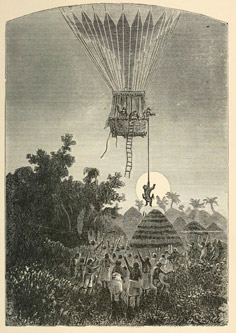Gods from Machines: Technology and Magic in Nineteenth-Century Imperial Encounters
Brian Wallace, Leverhulme Early Career Fellow
Starting from the familiar trope of the Victorian explorer greeted as a miracle-worker, this Leverhulme Trust funded project traces how unfamiliar Western technologies were reportedly perceived or deliberately misrepresented as magic in imperial encounters across the long nineteenth century, and how these self-aggrandising narratives shaped imperial ideologies.

The observation that any sufficiently advanced technology is indistinguishable from magic is not strictly an insight of the twentieth century but would have been eminently familiar in nineteenth-century Western societies which delighted in tales of indigenous peoples overawed by the wonders of modern science, from the popular memory of the ‘deified’ Captain James Cook to the imperial science-fantasies of Jules Verne.
Drawing on Manchester’s archives of exploration, colonial administration and missionary work as well as a wide range of contemporary journalism, travel writing, and fiction, Gods from Machines seeks to understand the origins, sites of transmission, and legacies of such techno-magical narratives.
It explores the magical discourses through which colonised peoples responded (or were imagined responding) to new technologies, from the bulletproof charms of anticolonial rebellions to the everyday rumours which attributed mystical qualities to imported innovations.
Structured thematically around technologies including weapons, electricity, transport, and medicine, the project seeks to understand how techno-magical narratives were used by both colonising and colonised peoples to deal, practically and imaginatively, with the disruptive technological advances of the long nineteenth century.
Current projects
Our research work is improving our understanding of people, cultures and societies around the world.
Read more
Past projects
An overview of completed projects from the John Rylands Research Institute and Library dating from 2017.
Read more
